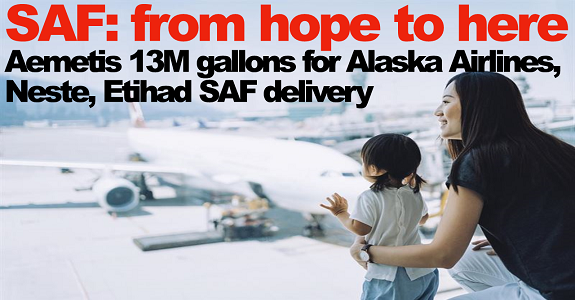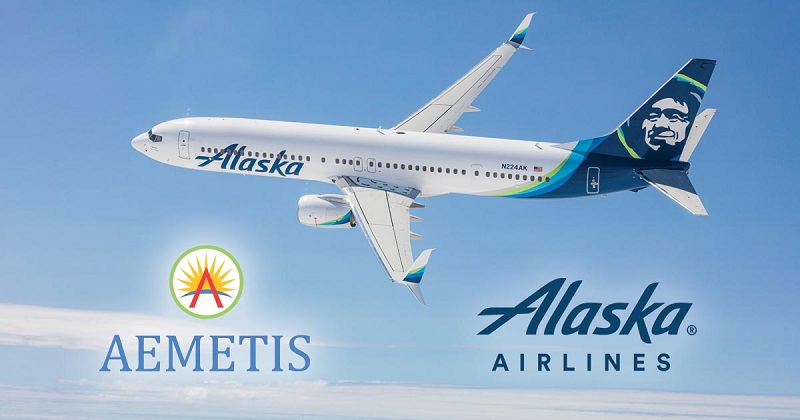SAF keeps flying high in 2022 – Aemetis 13M gallons for Alaska Airlines; Neste, Etihad SAF delivery

While news of IndyCar going 100% biofuel in 2023 is pretty exciting, it was also a big week for sustainable aviation fuel too. Between the news that the delivery of Neste MY Sustainable Aviation Fuel to Etihad Airways marks the first time in Japan that SAF will be supplied to an overseas airline at an airport in Japan and the news that Aemetis signed a 13 million gallon offtake agreement with Alaska Airlines, SAF just keeps flying high in 2022.
In today’s Digest, the Aemetis offtake agreement details, the Neste, ITOCHU, and Etihad partnership and SAF delivery in the Land of the Rising Sun, reactions from the stakeholders, and more.
Aemetis 13M Gallon Offtake Agreement with Alaska Airlines
Let’s start with the news from California that Aemetis, Inc. signed an offtake agreement with Alaska Airlines for 13 million gallons of blended sustainable aviation fuel to be delivered over the seven year term of the agreement.
What’s the fuel and where will it be made?
The blended fuel to be supplied under this agreement is 40% SAF and 60% Petroleum Jet A to meet international blending standards.
The sustainable aviation fuel is expected to be produced by the Aemetis renewable jet/diesel plant under development on a 125 acre former U.S. Army Ammunition production plant site in Riverbank, California.
Powered by 100% renewable electricity, the Aemetis Carbon Zero production plant design utilizes cellulosic hydrogen made from carbon negative waste wood from orchards and forests. The below zero carbon intensity, cellulosic hydrogen from waste wood is used to hydrotreat vegetable and other renewable oils to produce renewable aviation and diesel fuel.
To further reduce carbon intensity, the Aemetis Carbon Zero design includes capturing CO2 from the production plant and injecting the compressed CO2 into a sequestration well at the Riverbank site. The project is designed to permanently store an estimated 200,000 metric tonnes of CO2 each year from the plant.
Where’s it going?
The fuel will be delivered to San Francisco International Airport. The blended sustainable aviation fuel is also scheduled to begin deliveries to Qantas in 2025.
Reactions from the stakeholders
“To make a meaningful impact in decarbonizing aviation, we must increase the supply and accessibility of SAF,” said Lauren Kriegler, director of fuel, Alaska, “This partnership is an important step forward in making SAF readily available in one of our most important and busiest hubs. We look forward to working with Aemetis to expand the use of SAF in the Bay Area and beyond.”
“The use of sustainable aviation fuel by Alaska is another step by the oneworld Alliance toward lowering the environmental impact of aviation,” stated Eric McAfee, Chairman and CEO of Aemetis. “Our supply of SAF to the San Francisco International Airport is supported by the California Low Carbon Fuel Standard, creating new investment and jobs in disadvantaged minority communities in the state.”

Neste, ITOCHU, Etihad Airways in the Land of the Rising Sun
Now onto the Neste news that Neste and ITOCHU are celebrating the first delivery of Neste MY Sustainable Aviation Fuel to Etihad Airways, one of the airlines of the United Arab Emirates, in Japan. The delivery of Neste MY Sustainable Aviation Fuel to Etihad marks the first time in Japan that SAF will be supplied to an overseas airline at an airport in Japan.
The SAF will be delivered to Etihad’s aircraft at Narita International Airport.
This milestone is a result of the recently expanded partnership between Neste and ITOCHU to grow the availability of sustainable aviation fuel in Japan. ITOCHU acts as the branded distributor of Neste MY Sustainable Aviation Fuel in Japan, making Neste’s SAF available first at the two largest Japanese international airports: Tokyo Haneda and Narita.
SAF is a key element to achieving aviation’s emission reduction goals, and both Neste and ITOCHU are committed to supporting Japan in achieving the target of 10% SAF use by 2030, set by the Ministry of Land, Infrastructure, Transport and Tourism (“MLIT”).
Neste is committed to working together with the global aviation industry to achieve its emission reduction targets. Neste is currently expanding its SAF production capacity to 1.5 million tons per annum by the end of 2023. That includes up to 1 million tons of SAF production capacity in Neste’s Singapore refinery via the ongoing Neste Singapore Expansion Project, which will start operations by the end of the first quarter of 2023.
The fuel
Neste MY Sustainable Aviation Fuel can reduce greenhouse gas emissions by up to 80%*, in its neat form and over the life cycle, compared to fossil jet fuel. Neste-produced SAF is made from sustainably sourced, 100% renewable waste and residue raw materials. As a drop-in fuel it can be used with existing aircraft engines and airport fuel infrastructure, requiring no extra investment to them.
* Calculated with established life cycle assessment (LCA) methodologies, such as CORSIA methodology.
Reactions from the stakeholders
“This delivery of our Neste MY Sustainable Aviation Fuel to Etihad is a major step forward in further growing the use of our sustainable aviation fuel in the Japanese market,” says Sami Jauhiainen, Neste’s Vice President, Asia-Pacific, Renewable Aviation. “Our partnership with ITOCHU aims to support domestic and international airlines as well as other fuel suppliers at Haneda and Narita International Airports in accelerating the adoption of SAF to reduce the carbon emissions of flying. I’m excited to see this partnership is already achieving concrete results and I look forward to supporting more airlines in Japan going forward.”
“This delivery of SAF to Etihad Airways is the result of the partnership with Neste, and we are glad to be the first company to supply SAF to an overseas airline in Japan. ITOCHU will continue to cooperate with Neste and airlines departing from Japanese airports, and contribute to the decarbonization of the airline industry through the stable supply of SAF”, says Tsuyoshi Matsumoto, ITOCHU’s general manager of Petroleum Trading Department.
Tony Douglas, Group Chief Executive Officer, Etihad Aviation Group, said: “Etihad has committed to achieving net zero emissions by 2050 and reducing our 2019 emissions by 50 percent by 2035. For SAF to become a viable mid-term solution for aviation decarbonisation it requires collaboration between governments, corporates and the aviation industry to increase SAF supply and availability at airports, so it can be adapted more broadly. Our partnership with ITOCHU and Neste is an example of the type of industry collaboration that is required to bring widespread SAF adoption to the industry. We are extremely proud to be the first international airline to procure and use Japanese supplied SAF on flights departing Japan.”
Bottom Line
From race cars to airplanes, biofuels are growing their presence in real markets across the globe and that’s no small feat. Biofuels were at one point the fuel of hope, and now biofuels are in action in real markets, making a real difference. Of course, they still have a long way to go to replace fossil fuels on a larger scale, but it’s happening, one airline at a time, one race car competition at a time.
Category: Top Stories















